Norwich workers and traders share their views on home working
- Published
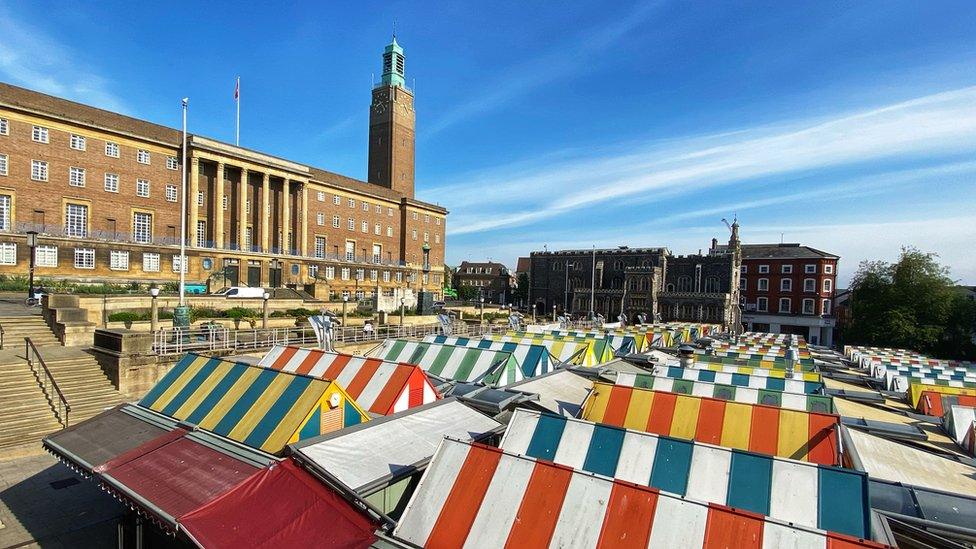
Norwich market opposite City Hall was voted best British market in 2019
Workers can return to the office from next month, if the lockdown roadmap goes to plan. But most firms won't ask staff to come back full-time, according to a BBC survey of 50 of the UK's biggest employers. Traders and office workers in Norwich have given us their views on the future of the workplace.

'I came back into the office as soon as I could'

Freddie Connelly said getting back to the office saved his mental health
Freddie Connelly is a claims handler for Aviva. The company is one of Norwich's biggest employers, with some 5,000 staff.
At the beginning of the year, the insurance giant said it would be looking to adopt home-working as standard practice.
It said time would be shared between working from home and in the office, depending on worker preferences.
Mr Connelly found he "couldn't cope" mentally with homeworking, and was "so grateful" he was one of the first to be allowed back, full-time, last month.
"It was so bad. I'm such a chatterer and I just needed to see people, so I came back into the office as soon as I could," he says.
Mr Connelly had moved to Norwich from London just before the pandemic hit in March 2020, meaning he did not get a chance to make friends.
He lives with his partner, who works at Starbucks in Norwich, so was alone for 90% of the day, something he was not used to.
As time went on he found the situation more difficult and working form home "compounded" his loneliness.
It led to him being diagnosed with depression and anxiety disorder.
"The whole isolation thing was horrible. I desperately needed to get back into an office and see people and actually have a conversation eye-to-eye," he says.
His workplace is "extremely" Covid-secure and he feels "100% happier, without a doubt" about being back in the office.

'The rest of the world has caught up'
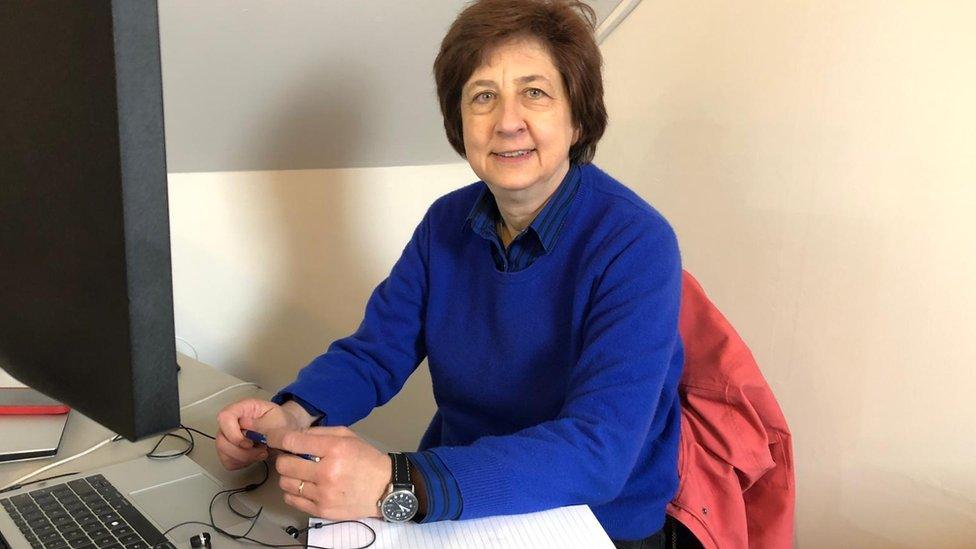
Deborah Sacks has been working form home since 2010 and regularly uses flexible shared office space
Deborah Sacks, a waste and resources specialist, believes she was ahead of the game when she set up her business in 2010.
She works from home and uses shared office space at Businesss Revolution, external in Norwich once or twice a week.
It means "a chance to get out of the house, somewhere where I can really focus, can't do the housework or get another snack," she says.
"I feel the rest of the world has caught up with where I was working before.
"It's important to meet other human beings, not just your family, where the Wifi is more reliable, a change of scenery really," she adds.

'Feeling anxious'
According to clinical psychologist Dr Beth Mosley, the return to the office is going to make some people "feel pretty anxious because it's another change".
"To have to go back into the office and re-learn some of those old skills, coupled with the pressures of the commute, for some people it will raise levels of anxiety," she says.
The key to coping is to "understand that your stress is natural".
"The best thing to do, is to do the thing we are worried about. It is normally the best way to stop feeling anxious about it."
She advises noticing the physical changes such as headaches or an increased heart rate and finding ways, such as deep breathing, to relax.
"We might struggle with change but actually we are incredibly good at adjusting," says Dr Mosley.

'We need office workers to come back'
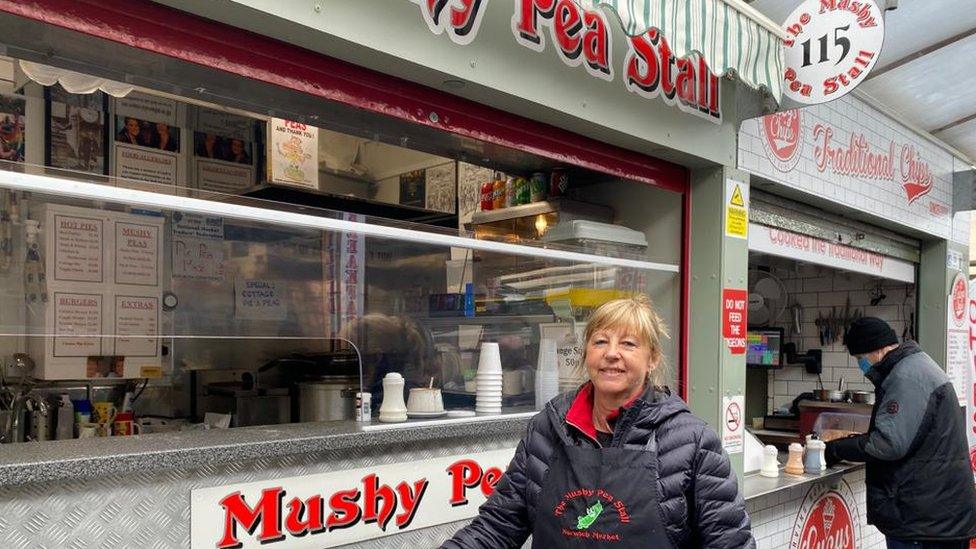
Anita Adcock is worried about the loss of footfall from fewer office workers
Anita Adcock owns the Mushy Peas stall on Norwich market. She cannot wait for more people to return to the office.
"We've already lost a lot of footfall from people not coming to the shops, who are buying online, so now with people not coming into work everyday, then we are going to lose them as well.
"A lot of our trade is lunchtime trade with people taking away for the office or standing and eating by the stall for half-an hour."
She says traders have been discussing ways to encourage more customers, including a covered seating area with heaters.
"I think what we need to do is to look at the market as a social meeting place again, like it used to be years ago," she adds.
"Maybe we need to start opening on evenings, but we need more facilities to allow us to do so," she adds.
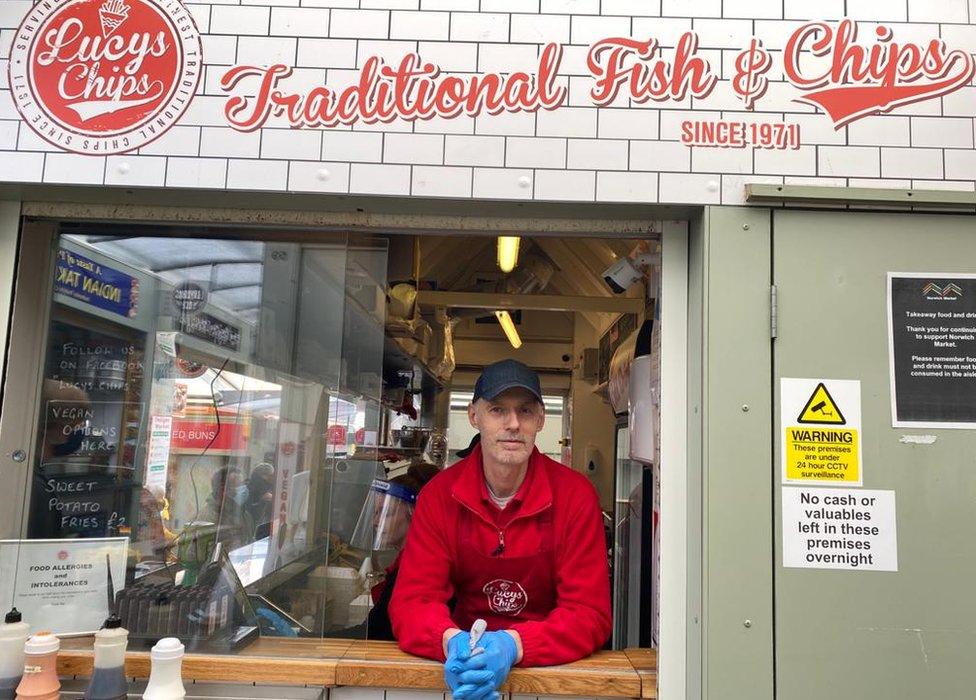
Barclay Gray says he "remains optimistic" but expects to be impacted by people choosing to permanently work from home
Two rows away is Barclay Gray of Lucys Fish and Chips.
"We're reliant on shoppers, visitors and a lot of people who work in the offices. At least 30-40% is the office employee," says Mr Gray who has eight people working for him.
Trade has been seriously affected by the pandemic but he has managed to retain all his staff.
"Hopefully more people will get fed-up of working from home and return to the office, that's what we need," he says.
Could he see any advantage to the new ways of working? If it meant when they do come into the office, workers treat the day as an event and eat out more?
"There is that side of it, yes, that could be a benefit," he adds.
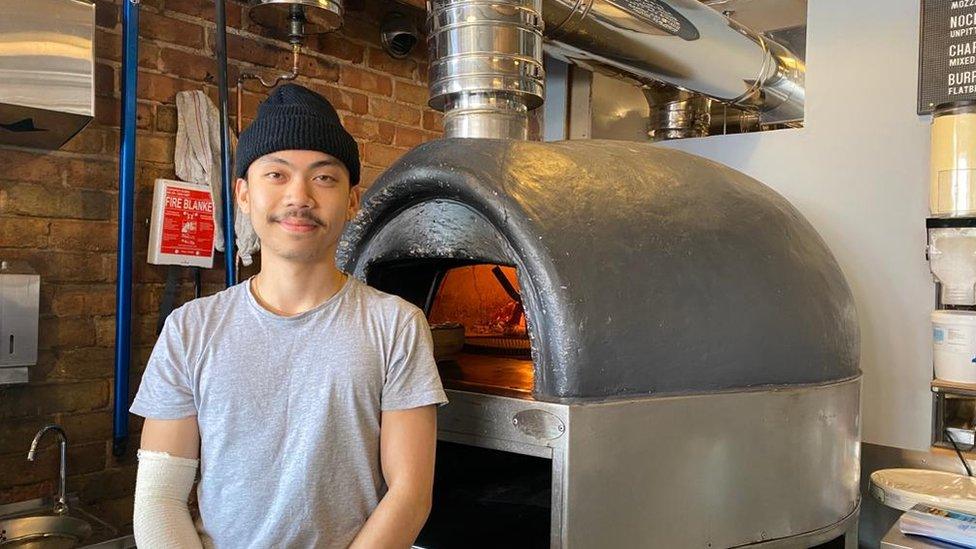
Brick Pizza diversified into frozen pizzas just as the pandemic hit
On the edge of the market is the Brick Pizza restaurant.
"We do get a lot of office workers from City Hall so it will have an impact," says manager Quinten Jianoran.
"I think for Norwich, with a lot of independent businesses, these could be hit quite hard by people taking the option to stay at home to work."
Nevertheless he is optimistic and believes the city will see more people return once restrictions are lifted.
"Even if people are working from home, they'll still want to get out of their houses at some point of the day, and weekends are still a thing," he adds.

Find BBC News: East of England on Facebook, external, Instagram, external and Twitter, external. If you have a story suggestion please email eastofenglandnews@bbc.co.uk, external
- Published6 May 2021
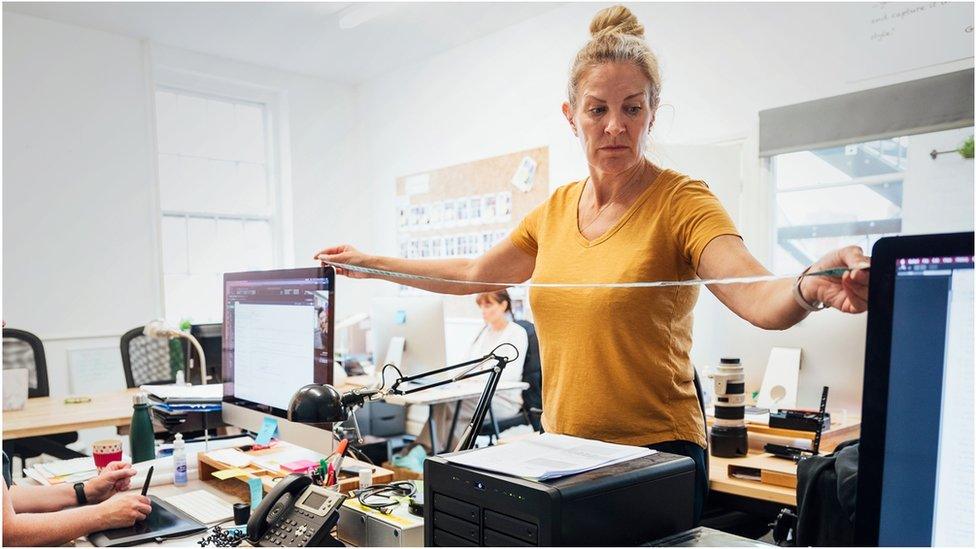
- Published21 January 2021

- Published16 June 2020

- Published2 February 2019
